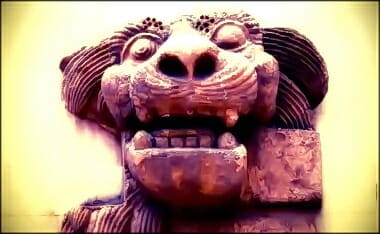A quick history of the Satanic Verses:
Dr. Thies has a great short article on the Islamic State destroying historical evidences of the Pagan roots of Muhammad’s faith:
…Sura 53:19-20 According to Islam, the Koran contains a revelation from Satan. An entreaty concerning three lesser deities, al-Lat, al-‘Uzza and Manat, worshipped by the people of Mecca. As a result of Muhammed invoking these gods, the people of Mecca no longer opposed him. Then, in a later revelation, Muhammed revoked this revelation, and recommenced prosecution of the people of Mecca.
The entire incident has been one of great controversy in Islam, although the logical implications of Satanic Verses being admitted to being included in the Koran has become taboo. Well, one of the remaining physical evidences of the gods of Mecca has been destroyed by ISIS: the statute of al-Lat, in the form of a lion, in the Syrian city of Palmyra, and dating back to the 1st Century AD. But, not to worry. ISIS isn’t destroying all the archeological treasures of this ancient city. Instead of destroying the 2,000 year old Roman theater, they are using it for public executions…
Jihad Watch notes that this incident led to the Islamic tradition of later verses in the Qur’an abrogating earlier ones, and why Islam practices “religious” violence.
…Incidentally, that passage in the Qur’an’s 53rd sura is the only trace left of the celebrated “Satanic Verses.” Long before the novel of the same name by Salman Rushdie, this term referred to an incident recorded in Islamic tradition, in which Muhammad tried to achieve reconciliation with the Quraysh by a “revelation” in which he declared, “So have you considered al-Lat and al-Uzza? And Manat, the third, the other one? They are the exalted cranes (gharaniq), worthy of veneration.” The Quraysh, hearing this, prostrated to Allah with the Muslims, who accepted the three goddesses as Allah’s daughters. But Muhammad soon realized that he had thus compromised the absolute monotheism that he had preached up to that point, and so he reneged, and claimed that Satan, not Allah, had inspired those verses, which were then duly replaced by the “revelation” recorded in Qur’an 53:19-22. The concept of abrogation, which ultimately led to the idea that the Qur’an’s violent passages take precedence over its peaceful ones, justified this change in still another “revelation”: “We do not abrogate a verse or cause it to be forgotten except that We bring forth better than it or similar to it. Do you not know that Allah is over all things competent?” (Qur’an 2:106)…
